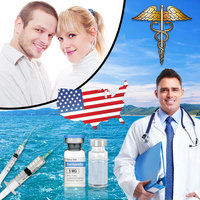Introduction to Testicular Health
Testicular health is a critical aspect of men's overall well-being, yet it often remains overlooked until issues arise. The testicles, part of the male reproductive system, are responsible for producing sperm and the hormone testosterone, which plays a vital role in male development and sexual health. Regular self-examination and awareness of the signs of testicular cancer are essential for early detection and successful treatment.
The Prevalence of Testicular Cancer
Testicular cancer, although relatively rare, is the most common cancer among American males aged 15 to 35. The American Cancer Society estimates that about 9,910 new cases of testicular cancer will be diagnosed in the United States in 2022. While the disease is highly treatable, especially when caught early, understanding its long-term implications is crucial for survivors.
Long-term Care for Testicular Cancer Survivors
Surviving testicular cancer is a significant milestone, but the journey does not end with the completion of treatment. Long-term care is essential to monitor for potential late effects of cancer treatment and to ensure overall health and well-being. Regular follow-up appointments with healthcare providers are necessary to check for any signs of cancer recurrence and to manage any side effects from treatment.
Potential Late Effects of Treatment
The treatment for testicular cancer, which may include surgery, chemotherapy, and radiation therapy, can lead to various long-term health issues. These can include infertility, cardiovascular disease, secondary cancers, and psychological effects such as anxiety and depression. It is important for survivors to discuss these risks with their healthcare team and to develop a personalized plan for monitoring and managing these potential late effects.
Maintaining Testicular Health Post-Treatment
After treatment, maintaining testicular health involves regular self-examinations and being vigilant about any changes in the testicles. Survivors should also focus on a healthy lifestyle, including a balanced diet, regular exercise, and avoiding tobacco and excessive alcohol consumption. These lifestyle choices can help mitigate some of the long-term risks associated with cancer treatment.
Fertility and Reproductive Health
One of the significant concerns for testicular cancer survivors is fertility. The treatment can impact sperm production and quality, leading to difficulties in conceiving. Before starting treatment, men should discuss fertility preservation options, such as sperm banking, with their healthcare providers. Post-treatment, regular consultations with a fertility specialist can help address any issues and explore available options for starting a family.
Psychological Support and Survivorship
The psychological impact of surviving testicular cancer should not be underestimated. Many survivors experience anxiety, depression, and fear of recurrence. Access to mental health support, such as counseling or support groups, can be invaluable in navigating these challenges. Engaging with other survivors can provide a sense of community and shared understanding, which can be comforting and empowering.
Advocacy and Awareness
Advocacy and awareness are crucial in improving outcomes for testicular cancer survivors. By sharing their stories and experiences, survivors can help raise awareness about the importance of early detection and the need for comprehensive long-term care. They can also advocate for better resources and support systems for those affected by the disease.
Conclusion
Testicular health and cancer survivorship are important topics that require attention and action from American males. By understanding the risks, engaging in regular self-examinations, and seeking appropriate long-term care, survivors can lead healthy and fulfilling lives post-treatment. It is essential for men to be proactive about their health and to seek support when needed, ensuring that they can thrive beyond cancer.
Contact Us For A Fast And Professional Response

- Testicular Cancer Survivorship: Navigating Health and Well-being Post-Treatment [Last Updated On: February 26th, 2025] [Originally Added On: February 26th, 2025]
- Testicular and Prostate Health: Interconnected Wellness for American Men [Last Updated On: March 16th, 2025] [Originally Added On: March 16th, 2025]
- Testicular Health and Fertility: Advances in Diagnosis and Treatment for Couples [Last Updated On: March 17th, 2025] [Originally Added On: March 17th, 2025]
- Testicular Health and Hormone Replacement Therapy: A Comprehensive Guide for American Men [Last Updated On: March 18th, 2025] [Originally Added On: March 18th, 2025]
- Exercise and Testicular Health: Enhancing Reproductive Wellness in American Males [Last Updated On: March 18th, 2025] [Originally Added On: March 18th, 2025]
- Understanding Testicular Pain: Causes, Diagnosis, and Treatment Options for American Males [Last Updated On: March 18th, 2025] [Originally Added On: March 18th, 2025]
- Economic Impact of Testicular Cancer Treatment on American Males: Costs and Disparities [Last Updated On: March 19th, 2025] [Originally Added On: March 19th, 2025]
- Testicular Health: Essential Knowledge for Young American Males [Last Updated On: March 20th, 2025] [Originally Added On: March 20th, 2025]
- Testicular Health and Mental Well-being: A Holistic Guide for American Males [Last Updated On: March 20th, 2025] [Originally Added On: March 20th, 2025]
- Smoking's Impact on Testicular Health: Risks and Remedies for American Males [Last Updated On: March 21st, 2025] [Originally Added On: March 21st, 2025]
- Testicular Health: Importance of Regular Check-ups and Self-Exams for American Men [Last Updated On: March 21st, 2025] [Originally Added On: March 21st, 2025]
- Testicular Cancer Screening Guidelines for American Men: Detection and Prevention [Last Updated On: March 21st, 2025] [Originally Added On: March 21st, 2025]
- Stress and Testicular Health: Impacts on American Men's Reproductive Wellness [Last Updated On: March 21st, 2025] [Originally Added On: March 21st, 2025]
- Diabetes Impact on Testicular Health: Insights for American Men [Last Updated On: March 21st, 2025] [Originally Added On: March 21st, 2025]
- Overcoming Psychological Barriers to Testicular Health Care in American Males [Last Updated On: March 22nd, 2025] [Originally Added On: March 22nd, 2025]
- Testicular Health and Autoimmune Disorders: A Comprehensive Guide for American Men [Last Updated On: March 23rd, 2025] [Originally Added On: March 23rd, 2025]
- Alcohol's Impact on Testicular Health and Fertility in American Men [Last Updated On: March 23rd, 2025] [Originally Added On: March 23rd, 2025]
- Community Support Enhances Testicular Health Awareness in American Males [Last Updated On: March 24th, 2025] [Originally Added On: March 24th, 2025]
- Steroid Use and Its Impact on American Men's Testicular Health: Risks and Recovery [Last Updated On: March 24th, 2025] [Originally Added On: March 24th, 2025]
- Testicular Health and Cardiovascular Disease: Insights for American Men's Proactive Care [Last Updated On: March 24th, 2025] [Originally Added On: March 24th, 2025]
- Public Health Campaigns Boost Testicular Health Awareness in American Men [Last Updated On: March 24th, 2025] [Originally Added On: March 24th, 2025]
- Occupational Hazards Impacting Testicular Health in American Male Workers: Risks and Prevention [Last Updated On: March 24th, 2025] [Originally Added On: March 24th, 2025]
- Nutrition's Impact on Testicular Health: A Guide for American Men [Last Updated On: March 24th, 2025] [Originally Added On: March 24th, 2025]
- Testicular Health and Sleep: Vital Links and Improvement Tips for American Males [Last Updated On: March 25th, 2025] [Originally Added On: March 25th, 2025]
- Illicit Drugs' Impact on Testicular Health: Risks and Protection Strategies for American Men [Last Updated On: March 25th, 2025] [Originally Added On: March 25th, 2025]
- Chemotherapy's Impact on Testicular Health: Insights for Male Cancer Survivors [Last Updated On: March 25th, 2025] [Originally Added On: March 25th, 2025]
- Ultrasound: Key to Diagnosing Testicular Conditions in American Males [Last Updated On: March 25th, 2025] [Originally Added On: March 25th, 2025]
- Telemedicine: Revolutionizing Testicular Health Care for American Men [Last Updated On: March 25th, 2025] [Originally Added On: March 25th, 2025]
- Exercise Boosts Testicular Health and Fertility in American Men: A Comprehensive Guide [Last Updated On: March 25th, 2025] [Originally Added On: March 25th, 2025]
- Testicular Health and Aging: Understanding Hormonal Changes in American Men [Last Updated On: March 25th, 2025] [Originally Added On: March 25th, 2025]
- Environmental Toxins and Lifestyle Impact on American Males' Testicular Health [Last Updated On: March 26th, 2025] [Originally Added On: March 26th, 2025]
- Understanding Testicular Health: Science, Conditions, and Reproductive Rights for American Men [Last Updated On: March 26th, 2025] [Originally Added On: March 26th, 2025]
- Breaking the Silence: Enhancing Testicular Health and Mental Well-being in American Males [Last Updated On: March 26th, 2025] [Originally Added On: March 26th, 2025]
- Testicular Health and Fertility Preservation: A Comprehensive Guide for American Males [Last Updated On: March 26th, 2025] [Originally Added On: March 26th, 2025]
- Socioeconomic Barriers to Testicular Health Care Access in American Males: Strategies for Improvement [Last Updated On: March 26th, 2025] [Originally Added On: March 26th, 2025]
- Testicular Health: Vital for Male Wellness and Chronic Disease Prevention [Last Updated On: March 26th, 2025] [Originally Added On: March 26th, 2025]
- Testicular Health and Chronic Pain Management Strategies for American Males [Last Updated On: March 26th, 2025] [Originally Added On: March 26th, 2025]
- Vitamins A, D, E, C, B: Essential for American Men's Testicular Health [Last Updated On: March 27th, 2025] [Originally Added On: March 27th, 2025]
- Genetic Counseling: A Key Tool in Preventing Testicular Cancer in American Males [Last Updated On: March 27th, 2025] [Originally Added On: March 27th, 2025]
- Antioxidants: Protecting Testicular Health and Enhancing Fertility in American Men [Last Updated On: March 27th, 2025] [Originally Added On: March 27th, 2025]
- Endocrine Disruptors' Impact on Testicular Health: Risks and Mitigation for American Males [Last Updated On: March 27th, 2025] [Originally Added On: March 27th, 2025]
- Testicular Health: Impact on American Men's Psychological Well-being and Body Image [Last Updated On: March 27th, 2025] [Originally Added On: March 27th, 2025]
- Radiation Therapy's Impact on Testicular Health: Effects, Protection, and Management [Last Updated On: March 27th, 2025] [Originally Added On: March 27th, 2025]
- Lifestyle Diseases and Testicular Health: A Guide for American Men [Last Updated On: March 28th, 2025] [Originally Added On: March 28th, 2025]
- Viral Infections and Testicular Health: Impacts, Mechanisms, and Prevention Strategies [Last Updated On: March 28th, 2025] [Originally Added On: March 28th, 2025]
- Testicular Health and Immune Function: A Vital Link for American Males [Last Updated On: March 28th, 2025] [Originally Added On: March 28th, 2025]
- Breaking Stigma: Enhancing Testicular Health and Mental Well-being in American Males [Last Updated On: March 28th, 2025] [Originally Added On: March 28th, 2025]
- Enhancing Testicular Health Awareness and Education in American Males [Last Updated On: March 29th, 2025] [Originally Added On: March 29th, 2025]
- Support Groups: Vital for Testicular Cancer Care and Recovery in Young American Men [Last Updated On: March 29th, 2025] [Originally Added On: March 29th, 2025]
- Heat Exposure's Impact on Testicular Health and Fertility in American Men [Last Updated On: March 30th, 2025] [Originally Added On: March 30th, 2025]
- Modern Lifestyles and Testicular Health: Risks and Mitigation Strategies for American Men [Last Updated On: March 31st, 2025] [Originally Added On: March 31st, 2025]
- Herbal Supplements for Testicular Health: A Guide for American Men [Last Updated On: April 1st, 2025] [Originally Added On: April 1st, 2025]
- Testicular Health: Understanding, Examining, and Preventing Common Conditions [Last Updated On: April 2nd, 2025] [Originally Added On: April 2nd, 2025]
- Testicular Health and Mental Resilience: A Comprehensive Guide for American Men [Last Updated On: April 3rd, 2025] [Originally Added On: April 3rd, 2025]
- Antibiotics' Impact on Testicular Health in American Men: Research and Implications [Last Updated On: April 4th, 2025] [Originally Added On: April 4th, 2025]
- Environmental Toxins and Testicular Health: Advocacy for Safer Policies [Last Updated On: April 7th, 2025] [Originally Added On: April 7th, 2025]
- Heavy Metals' Impact on Testicular Health in American Men: Mechanisms and Prevention [Last Updated On: April 8th, 2025] [Originally Added On: April 8th, 2025]
- Enhancing Testicular Health: Education, Lifestyle, and Environmental Strategies for American Males [Last Updated On: April 9th, 2025] [Originally Added On: April 9th, 2025]
- Understanding Testicular Health: Science, Disorders, and Literacy for American Males [Last Updated On: April 9th, 2025] [Originally Added On: April 9th, 2025]
- Enhancing Testicular Health Education: The Vital Role of Community Health Workers [Last Updated On: April 10th, 2025] [Originally Added On: April 10th, 2025]
- Advancements in Testicular Health: Diagnosis, Treatment, and Prevention for American Males [Last Updated On: April 10th, 2025] [Originally Added On: April 10th, 2025]
- Mental Health Professionals' Vital Role in American Men's Testicular Health Care [Last Updated On: April 10th, 2025] [Originally Added On: April 10th, 2025]
- Pesticide Exposure Linked to Testicular Dysfunction in American Men: A Comprehensive Review [Last Updated On: April 10th, 2025] [Originally Added On: April 10th, 2025]
- Enhancing Male Wellness: Integrating Testicular Health in Workplace Programs [Last Updated On: April 10th, 2025] [Originally Added On: April 10th, 2025]
- Testicular Health: Science, Disorders, and Proactive Care for American Males [Last Updated On: April 12th, 2025] [Originally Added On: April 12th, 2025]
- Physical Therapy: A Key to Managing Testicular Health in American Men [Last Updated On: April 12th, 2025] [Originally Added On: April 12th, 2025]
- Plastics and Male Health: EDCs' Impact on Testicular Function in American Men [Last Updated On: April 12th, 2025] [Originally Added On: April 12th, 2025]
- Testicular Health and Mental Well-being: A Comprehensive Guide for American Males [Last Updated On: April 17th, 2025] [Originally Added On: April 17th, 2025]
- Exercise Programs Boost Testicular Health and Male Reproductive Wellness [Last Updated On: April 17th, 2025] [Originally Added On: April 17th, 2025]
- Testicular Health and Mental Well-being: Awareness and Action for American Men [Last Updated On: April 17th, 2025] [Originally Added On: April 17th, 2025]
- Educational Campaigns Boost Testicular Cancer Awareness and Early Detection in American Men [Last Updated On: April 18th, 2025] [Originally Added On: April 18th, 2025]
- Enhancing Testicular Health: Nutrition, Education, and Awareness for American Males [Last Updated On: April 19th, 2025] [Originally Added On: April 19th, 2025]
- Testicular Health and Mental Well-being: Integrating Care for American Males [Last Updated On: April 19th, 2025] [Originally Added On: April 19th, 2025]
- Air Pollution's Impact on Testicular Health in American Men: Research and Implications [Last Updated On: April 19th, 2025] [Originally Added On: April 19th, 2025]
- Advancing Testicular Health: Science, Policy, and Advocacy Needs in the U.S. [Last Updated On: April 19th, 2025] [Originally Added On: April 19th, 2025]
- Water Contaminants and Testicular Health: Impacts on American Men's Fertility [Last Updated On: April 20th, 2025] [Originally Added On: April 20th, 2025]
- Genetic Testing: A Key to Managing Testicular Health in American Men [Last Updated On: April 20th, 2025] [Originally Added On: April 20th, 2025]

















